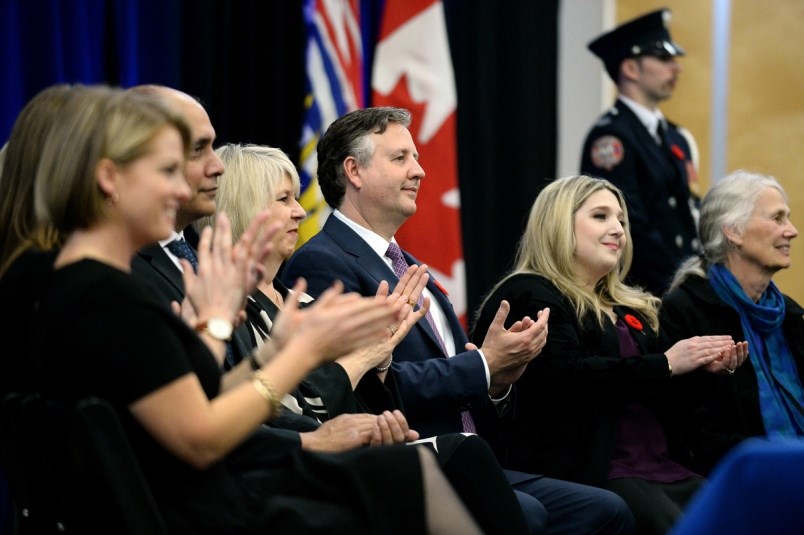This new mayor of yours, Vancouver, is doing things a little differently on the transparency front.
Sometime this week, you will be able to go to the city’s website and check out Mayor Kennedy Stewart’s previous month’s calendar of appointments. The calendar will list names of people he met with or talked to by telephone, and events he attended since inaugurated Nov. 5.
That’s a good thing, said every reporter in the city who has had to previously request such information via the Freedom of Information and Protection of Privacy Act.
Why should you care?
Because such information can give you a sense of who has the ear of the mayor, and who and what is important to Stewart as he settles in at city hall to serve a four-year term.
Of course, it would be naïve to assume politicians put all their appointments in their calendar. But the move by Stewart suggests some early good will on his promise to be more transparent about his business as mayor.
In that spirit, Stewart also plans to post this week a fairly easy-to-read breakdown of his $1.3 million office budget for 2019, something his predecessors never did.
Stewart’s budget breakdown will include pie charts.
Those charts will show the bulk of Stewart’s budget--$577,000—will be spent on salaries of his staff, which includes two co-chiefs of staff, a director of communications and policy and at least two “special assistants” to the mayor.
Stewart’s salary for 2019 will be $176,000.
Memberships and event fees for such organizations as the Vancouver Board of Trade are budgeted at $80,000. A total of $91,000 is being set aside for meeting expenses ($15,000), transportation ($14,000), local expenses ($16,000) and phones ($10,000).
Benefits, the employer health tax and “other costs” amount to $99,000.
The mayor budgeted for $70,000 in travel expenses next year, although he made it clear in a scrum following his inauguration that he didn’t plan to travel a lot, saying his focus was in Vancouver and addressing the housing crisis.
His predecessor, Gregor Robertson, was frequently on the road, or in the air.
For example, in 2017, Robertson visited the following places: Victoria, Ottawa, Haida Gwaii, Seattle, Toronto, Chicago, Belgium, New York, Australia and China. The tabs for at least four of those trips were picked up by organizers, including $5,918 at the Global Covenant of Mayors for Climate and Energy Board meeting in Belgium.
Taxpayers’ portion of Robertson’s tabs for travel and conferences in 2017 totalled $41,820.
Stewart is posting his budget during the same week he and council are expected to approve next year’s $1.5-billion operating budget and $371 million in new capital spending. That proposed budget comes with a 4.9 per cent property tax increase and hikes in utility and recreation fees.
Those increases are not lost on NPA Coun. Lisa Dominato, who successfully moved a motion last week to have city staff review the budgets of the mayor and council to look for cost savings. Dominato wanted the review to be conducted before this week’s budget vote, but it will instead be done for the 2020 budget.
“It’s incumbent upon us to go look in the mirror and say, ‘OK, where can we go sharpen the pencil internally?’” said Dominato, who was among eight new councillors elected Oct. 20. “I don’t think we should be rubber stamping a budget that’s just come forward in the last number of weeks to us as a new council. It concerns me that there’s a bit of rush to adopt this budget as it is.”
Dominato’s research showed the mayor’s budget under Robertson increased by 24 per cent in 2015 and, as Stewart’s budget revealed, is now more than $1 million. The budget for all 10 councillors, which includes salaries and benefits, is $1.7 million.
Councillors, by the way, will earn close to $90,000 per year next year.
Dominato emphasized her motivation for a review is not personal, but by a need to see how the city can lessen the load on residents burdened by ever-increasing costs. Annual property tax increases, rent hikes and increases in gas prices, transit fares, insurance rates and food prices are realities of living in Vancouver.
“If no one asks the question, then it’s not going to get looked at,” she said. “It’s a part of our job in terms of good governance.”
Council will meet Tuesday at 9:30 a.m. to debate the operating budget and new capital spending for an anticipated final vote, although some councillors hinted at previous meetings that a vote might be deferred until the new year.
The provincial government’s deadline to pass a balanced operating budget is April 1.
@Howellings



